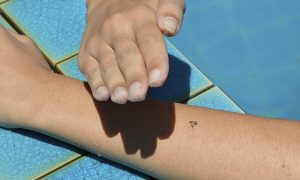Are You Prone to Mosquito Bites?
Ever feel like you have a target on your back (or arms or legs) for mosquitoes? Turns out, you might.
Ann T. MacIntyre, DO, a Miami-based osteopathic physician specializing in infectious diseases, notes that research has found some people are more prone to mosquito bites.
“Type O blood, for example, is more attractive to mosquitoes than other types,” Dr. MacIntyre says.
Focusing on preventive care, Doctors of Osteopathic Medicine, or DOs, consider how environmental and lifestyle factors impact your health. That is why DOs recommend incorporating mosquito repellent into your daily warm weather routine to help prevent the infection and spread of nearly a dozen illnesses caused by those pesky bites.
Risk Factors for Mosquito Bites
Besides blood type, you might be more prone to getting mosquito bites if you:
- Emit more carbon dioxide. “Larger people, pregnant women and people who exercise exhale more carbon dioxide, another attractant for mosquitoes,” Dr. MacIntyre says.
- Exercise outdoors. “Sweat, heat and lactic acid can attract mosquitoes, hence a propensity for people to get bitten when they are exercising versus those who are sedentary,” Dr. MacIntyre says.
- Have bacteria or cholesterol deposits on the skin’s surface. According to Dr. MacIntyre, naturally occurring chemicals and bacteria can be present on the skin’s surface—and this isn’t something that’s easy to change. “Cholesterol on your skin may not be an indication of an elevated cholesterol level. Some individuals simply have higher levels on their skin surface due to other metabolic processes,” Dr. MacIntyre explains.
Prevention
Genetics are the biggest determinant of one’s susceptibility to mosquito bites. However, since we cannot readily change our genes, Dr. MacIntyre stresses the importance of preventing bites through the usage of mosquito-repellents with DEET.
When going outdoors, wearing long sleeves and pants can be an effective deterrent to mosquito bites, she adds.

